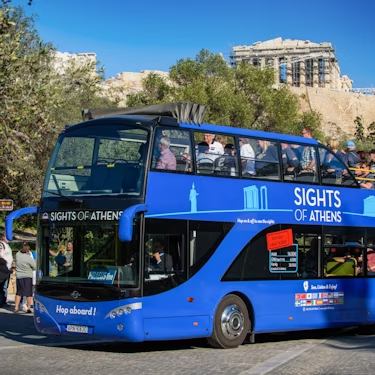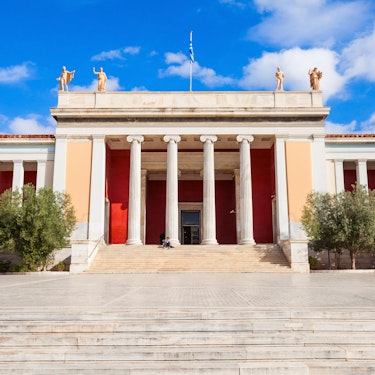More about: Athens in 7 Days: a guidebook for getting the most out of your visit
The Greek capital is a land of cultural tradition that adapts to any type of traveler. In this post I have prepared a 7-day itinerary to follow the route of the gods of Olympus.
You will explore archaeological wonders, monasteries on rugged peaks, vibrant streets, paradisiacal beaches, museums that trick the senses and much more. Let's get started!
Day 1: Athena and Zeus: Acropolis - Plaka - The Parthenon
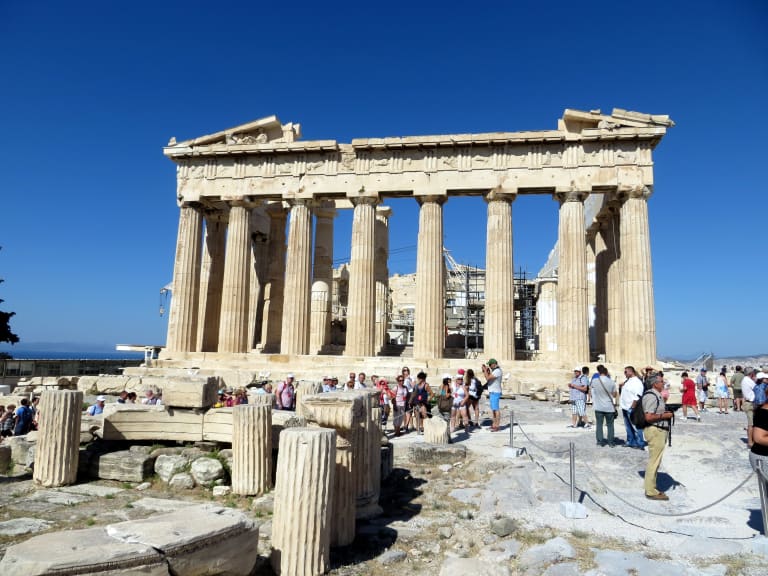
After your transfer from the Athens airport, the tour starts with Zeus, the father of gods and men -according to Greek mythology-, together with his favorite daughter, Athena, the goddess who with wit and wisdom became the patron saint of the city.
From the Presidential Palace of Athens to the Parthenon you will find yourself in the middle of the National Garden of Athens, very close to the Jewish Museum of Greece, as well as the famous Hadrian's Arch and the Mausoleum of Philopapus. There are literally hundreds of points of interest, just for this area alone you will need a day in Athens, but don't worry, here I leave you a map with all the things to see and do that you should not miss on your visit to simplify your tour to 3 km.
You can follow this route walking, although the nearest metro station is Syntagma, which is in front of the National Garden of Athens and is the same place where the tourist bus would leave you in the city. If you prefer, you can also take a bike tour. In any case, below, I detail everything you should not miss this first day in Athens:
The changing of the military guard of the Evzones
Since the mid-1800s, a special unit of the Hellenic Army has guarded the Monument to the Unknown Soldier in front of the Greek Parliament. These guards whose name has changed from Tsoliades to Evzones, every hour do a changing of the guard north of Syntagma Square.
- Price: free of charge.
- Hours: from Monday to Sunday every hour.
- Address: Leoforos Vasilissis Amalias 133, Athens 105.
Panathenaic Stadium
It was built in the early 300's B.C. to host the Panathenaic Games that were held every four years in honor of the goddess Athena. When Herod took power the stadium was renamed: Kallimarmaro, translated as "beautifully marbled". The Panathenaic Stadium hosted the first modern Olympic Games in 1896.
- Price: from 5 euros.
- Hours: from Monday to Sunday, from 8 am to 7 pm, between March-October. From 8 a.m. to 5 p.m. between November and February.
- Address: Vasileos Konstantinou Sve, Athens 116.
Temple of Olympian Zeus
To honor the Sovereign of Olympus, the largest temple in ancient Greece was built, preceded by Hadrian's Arch. The construction of the Temple of Olympian Zeus was a challenge that began in 515 BC and was completed in the second century during the Roman era.
- Price: from 11 euros.
- Hours: Wednesday to Sunday, between 8 a.m. and 7:30 p.m., and Mondays, between 11 a.m. and 7:30 p.m., from April to October. The rest of the year from Monday to Sunday between 8 am and 3 pm.
- Address: Vassilissis Olgas Ave, Athens 105.
Plaka
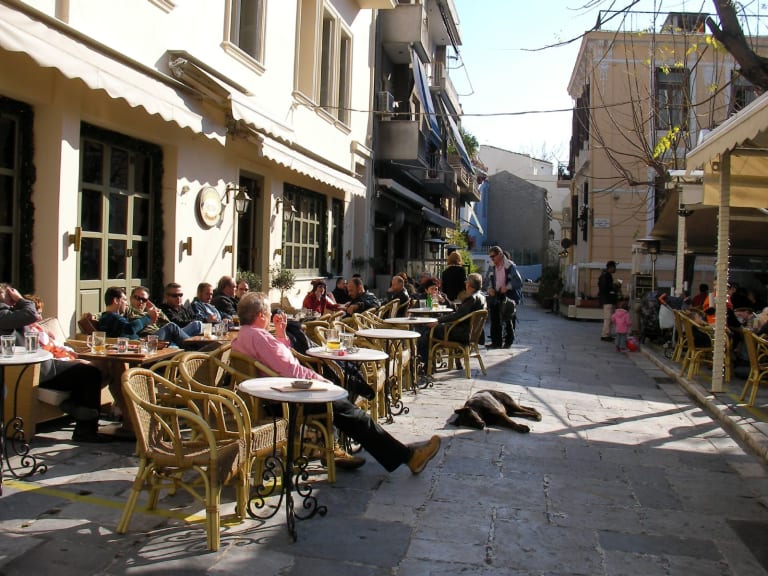
Cross Hadrian's Arch again to lose yourself in the oldest shopping streets of Athens in Plaka. Apart from seeing the Monastiraki flea market you will find bars and restaurants with the best of Athenian food. Having lunch there is one of the best things to do in Plaka.
The Acropolis - Acropolis Museum
This is Athens' main attraction, the "Upper City" or Sacred Rock. Take a guided tour of the Acropolis and explore the beating heart of the Athenian political system among pristine exhibits.
- Price: from 16 euros.
- Hours: Monday, 8 a.m. to 4 p.m.; Tuesday to Sunday, 8 a.m. to 8 p.m. between April and October. The rest of the year from Monday to Thursday from 9 am to 5 pm; Fridays from 9 am to 5 pm, and Saturdays and Sundays from 9 am to 8 pm.
- Address: Dionysiou Areopagitou 15, Makriyianni, Athens 117.
The Parthenon
It was built in honor of the goddess Athena, as thanks for the triumph during the Persian Wars. The Parthenon, whose Greek translation is "virgin", is the main ancient structure of the Acropolis and symbol of Athens. This point has been an obligatory stop for different civilizations, so it is essential to enter and learn about its history.
- Price: from 20 euros.
- Hours: Monday to Sunday, from 8 am to 8 pm.
- Address: Acropolis, Athens 105.
The Temple of Athena Nike
Athena is the goddess of wisdom, but this magnificent room celebrates the protective and fighting facet of this deity, who by the way also faced Poseidon and, after winning her battles -the footprints are commemorated with the Erechtheion or Erechtheion-, became the sovereign of the Greek capital.
- Price: included with the Acropolis ticket (from 20 euros).
- Hours: Tuesday to Sunday, 8 am to 7:30 pm, Mondays, 11 am to 7:30 pm between April and October. The rest of the year from Monday to Sunday between 8:30 am and 3 pm.
- Address: Athens 105, to the right of the Acropolis.
At the end of the day you can close with the sunset from the restaurants surrounding the Acropolis.
Day 2: Aphrodite, Ares and Hephaestus: interacting with Greek art

Begin your second day's tour of Athens' iconic museums and temples. You can travel by metro and stay at Thēseio or Monastiraki station and you will be very close to your first stop. You can also use the tourist bus: stop number 14 on the red line (A Monastiraki Square) drops you off at the same place.
If you travel with your kids remember that family passes (2 adults + 2 children) have a special discount. Here is a map of the suggested route here.
Temple of Ares and the Altar of the Twelve Gods
Start with a reconnaissance to the north of the Agora where the Altar of the Twelve Gods, the Odeon of Agrippa and the Monument of the Eponymous Heroes surround the remains of the monument to the Greek god of war, the Temple of Ares.
- Price: free of charge.
- Hours: n /a.
- Address: Athens 105.
Agora Museum
The Stoa of Attalus II was built around 150 BC by order of King Attalus II of Pergamon as a gift to the city that educated him. However, the structures did not resist and, today, the Agora Museum is the reconstruction of the ruins of the Stoa made in the mid 1950's.
In the Agora, Socrates, Plato, Aristotle and other philosophers discussed the political and economic dynamics 2,500 years ago. In these 116x20x13 meters is the heart of Attica.
- Price: from 10 euros.
- Hours: Monday to Sunday, from 8 am to 6 pm.
- Address: Adrianou 24, Τ.Κ.
Temple of Aphrodite
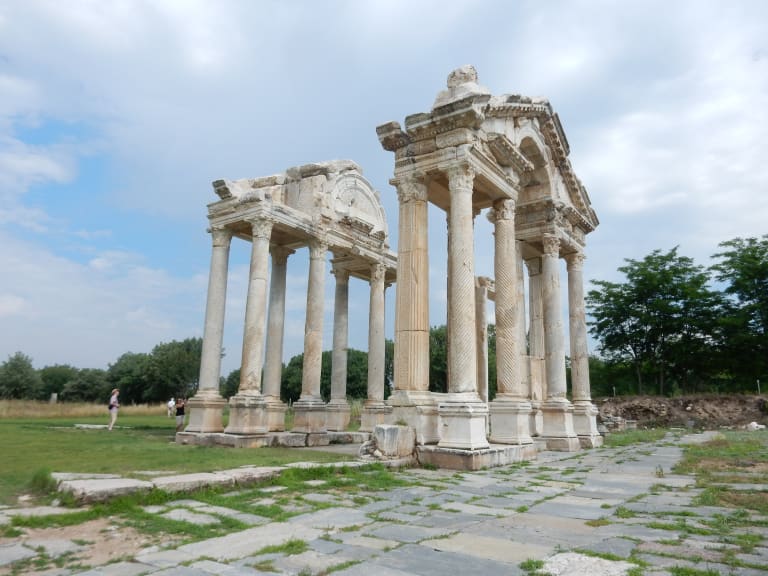
Just 350 meters from the Agora Museum a monument to the Greek goddess of ethereal love was built. It is Aphrodite Urania. It was in the 1990s when archaeologists identified among the ruins the temple of the daughter of Uranus.
Before learning the details of how Plato reconciled the conceptions, Aphrodite by Homer and Hesiod in the Temple of Aphrodite Urania, you see the ruins of the church of St. Thomas and soon you will walk down Adrianou Street, a busy space where the offer of restaurants and cafes is tempting to make a gastronomic tour. It will be the perfect place to sit down for lunch.
- Price: from 10 euros.
- Opening hours: Monday to Sunday, from 9 am to 7 pm.
- Address: Atenas 105.
Museum of Illusions of Athens
Live a sensory experience at the Museum of Illusions of Athens, get lost in an infinite tunnel, defy the laws of gravity in the reverse room, shrink to miniature size, change the order of the cardinal points, see yourself in the kaleidoscope .... This museum lets your imagination run wild and is ideal for families visiting Athens. The fun is multiplied in good company.
- Price: over 16 years old from 10 euros.
- Hours: Monday to Friday, 10 am to 9 pm. Saturdays and Sundays, from 10 am to 10 pm.
- Address: Ermou 119 (entrance through Astigos 12).
Herakleidon Museum
At 600 m from the Museum of Illusions you immerse yourself in the millenary culture among engineering works. Trirremes- warships, interactive exhibits and the best of Greek sophistication in technology at the Herakleidon Museum. If you like the evolution of science, art and technology, eureka, in this 2-building museum you find the exhibition of your dreams.
- Price: from 5 euros.
- Hours: Wednesday to Sunday, from 10 am to 6 pm.
- Address: 16 Herakleidon St.Thissio and 37 Ap. Pavlou ST.
Temple of Hephaestus
Just a few steps from the Herakleidon Museum is the Temple of Hephaestus or Hephaestion, which was completed shortly before the opening of the Parthenon. The result was so solid that the structure remains almost intact today.
- Price: from 10 euros.
- Hours: Monday to Sunday, from 8 am to 7 pm.
- Address: 24 Adrianou St.
Day 3: Poseidon: Escape to Cape Sunio

On the third day you will visit the magnificent Temple of Poseidon and on the way you will have some interesting stops, all along the shores of the Aegean Sea. Take a look at the suggested map.
The Temple of Poseidon is located at Cape Sunio. From the city center it is a 2 hour direct drive. You can go on your own in a non-stop bus that you can take from Egypt Square, or you can sign up for a day tour to Cape Sunio. On these tours you have the choice of going by bus, SUV or private transport. What will be interesting will be the stops between the 5-8 hours of the tours:
Kavouri, Alimos, Glyfada, Voula, Faliro
Contrast the trendy suburbs in the Athenian countryside. Kavouri, Alimos, Glyfada, Voula, Faliro, Varkiza, Lagonisi, Saronida... are some of the towns that are part of the guided tours to the Temple of Poseidon. In addition to finding beautiful landscapes and trendy restaurants, you can also take a dip in some of the beaches of the Aegean.
Lake Vouliagmeni
Vouliagmeni is a tourist town known for its thermal water caves that make up Lake Vouliagmeni. Healing powers are attributed to the water of the place. All surrounded by impossible cliffs, so you get steep climbs, water activities at your leisure and breathtaking views.
Temple of Poseidon
This is said to be the place where Poseidon divided the armada when he was trying to eradicate Attica. After his failure in battle with the goddess Athena, he did not become ruler of this Greek countryside. However, his sanctuary is in a privileged site.
At Cape Sunio you can bathe in its beaches, but the most interesting thing is the sunset offered by the Temple of Poseidon or the beauty of the full moon. In this area you will dine with a delirious view of the Saronic Gulf before returning to the center of Athens.
Day 4: Apollo and Delphi: the Navel of the World
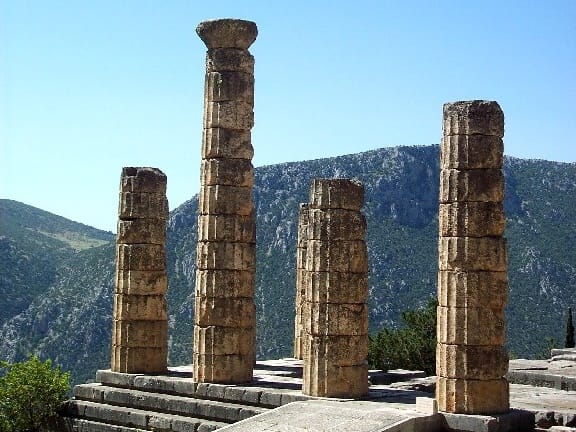
Your fourth day of your trip is dedicated to another of the best day trips from Athens, discovering Delphi, which the ancient Greeks considered the center of the world.
This UNESCO World Heritage Site is easily accessible by road. Buses leave from Liossion Street and have six daily frequencies for this 3-hour journey. You can also rent a car and follow the route on the map. The most comfortable way is to take a guided tour, so you can enjoy the panoramic views and worry only about appreciating the navel of the world. Stops for this day include:
Temple of Apollo
After touring the plain of Boeotia and Thebes, the birthplace of King Oedipus, you will visit the site of the Pythian Games and the famous Temple of Apollo. There you will find the remains of the oracle of Delphi, who predicted the future and imposed divine sanctions on certain political activities in the city.
At the end of the tour, you will stop for lunch at a traditional restaurant in the area.
Archaeological Museum of Delphi
It houses important finds, most of which were discovered in the area of the sanctuary of Delphi. The exhibits are distributed in fourteen rooms in chronological order. Highlights include the charioteer of Delphi, the frieze of the Treasury of Siphni, the Sphinx of Naxos, chryselephantine sculptures and bronze statuettes.
After your visit to the museum, stroll through Arakhova, a picturesque mountain village at the foot of Mount Parnassus before returning to Athens.
Day 5: Holy Trinity: Escape to Meteora
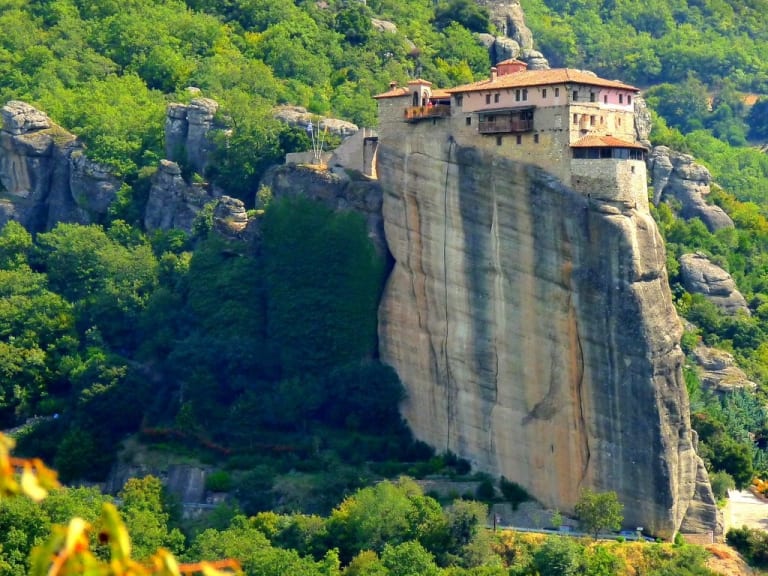
Delphi is beautiful, but Meteora is spectacular. Some, in fact, prefer to do a combined excursion to Delphi and Meteora. I leave it up to you to choose what you want to do. For now, on your fifth day escape to the city of monasteries, caves and cliffs, Meteora.
Travel from Athens is largely by train from Larissis Central Station. It is the easiest and most comfortable way to travel the nearly 5-hour journey to Kalambaka, at the foot of the six priories that make up the monasteries of Meteora. Follow the map, namely:
- Most Holy Trinity (Agias Triada)
- Great Meteora or Megalo Meteoros
- St. Nicholas
- St. Stephen
- Roussanou (Agia Varvara)
- Varlaam
Once you arrive at Meteora, wander through the hermit caves of Badovas and the Byzantine-era priories. All located on top of huge rock formations. The tour is a delight and among the little red houses you will see in the valley you will find some traditional restaurants where you can have lunch or a snack before returning to Athens.
Day 6: Hydra, Poros and Aegina: Escape of nymphs and other creatures

As you are finding out, there are many things to do in Athens. On the sixth day of your tour, I recommend that you relax by the sea and visit some of the most beautiful spots aboard a Greek Islands cruise from Athens to see:
Aegina
This island is named after one of the nymphs of the controversial history with Zeus. Also known as Aegina, it offers magnificent scenery: crystal clear waters, another of the Sanctuaries of Apollo and the Temple of Aphaya which is part of the sacred triangle of the Parthenon.
Poros
Poros is one of the primordial beings of Greek mythology: chance. This colorful town abounds with restaurants and bars in a year-round summer atmosphere. In addition to jumping into the sea, you can visit the Monastery of Zoodochos Pigi and the popular lemon grove of Poros, an idyllic place filled with waterfalls and windmills in the shade of the trees.
Hydra
This island honors the three-headed monster that represented chaos, Hydra. Here are located the Lazaros Koundouriotis Historical Mansion, a Byzantine Museum, the archontic or Maisons de Hydra, as well as the Hydra and Palamidas trails, a paradise for those who want to explore the island on foot. Choose your seafront or mountain activity Hydra has it all for you.
This combined cruise is one of the things to do from Athens in summer. Prices are cheap (you spend less than on Mykonos), the beaches are lovely and packages usually include folklore shows, transportation to and from the hotel, meals and guided tours.
Day 7: From Zeus to St. George, say goodbye to Athens from the heights

On the last day I suggest you climb Mount Lycabettus to enjoy the city from the highest hill in Attica. Finally, relax on a cruisealong the coast of Athens.
Mount Lycabettus
At this 227-meter summit you have a 360° panoramic view. On a clear day you can even see the island of Aegina from the top of Athens. There stands the Church of St. George Lycabettus on the foundations of the first Temple of Zeus. To get to Mount Lycabettus, take the train to Evangelization station and there choose to climb up the mountain for 1.1 km or in a cable car cabin.
You can climb this peak between 9 am and 2 pm from Monday to Sunday. Once you come down you can have a snack at one of the cafes at the foot of the mountain or go straight to your next stop.
Cruise along the Athenian coast
To close with a flourish, board a catamaran cruise around Athens from Agios Kosmas Marina. It will be 4-5 hours where the crew will pamper you while you sunbathe on the Aegean Sea.

